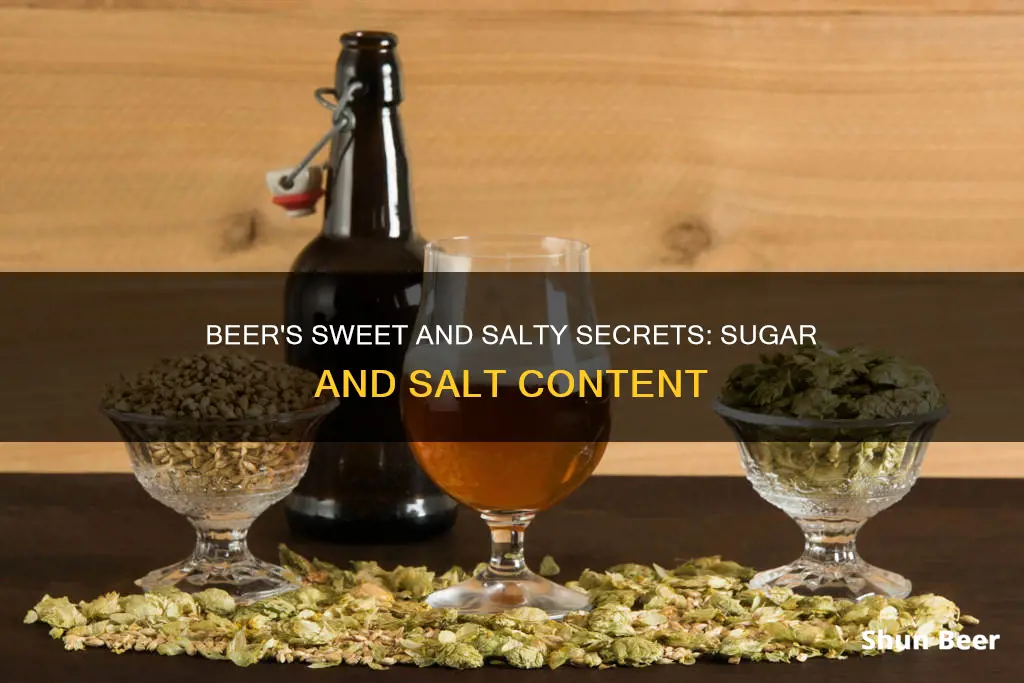
Beer is a popular alcoholic drink, but is it healthy? This is an important question, especially for those watching their weight or concerned about heart disease. While beer does not contain high amounts of salt or sugar, it can still impact your health. A 12-ounce can or bottle of regular beer contains around 14 milligrams of sodium, which is much lower than a carbonated soft drink. However, excessive beer consumption can lead to health issues such as hyponatremia, also known as beer potomania. Beer also contains carbohydrates, which can raise your blood sugar levels, and alcohol, which can impair sugar metabolism and lead to hypoglycemia. Understanding the impact of beer on your health is crucial, especially if you have diabetes or pre-diabetes.
| Characteristics | Values |
|---|---|
| Does beer contain salt? | Beer does contain a small amount of salt. A 12-ounce can or bottle of regular beer contains around 14 milligrams of sodium. |
| Does beer contain sugar? | Beer contains very little sugar, with most beers containing none at all. However, sugar is an essential element in the beer-making process. |
| Does beer contain carbohydrates? | Beer does contain carbohydrates, which can raise your blood sugar. |
What You'll Learn
- Beer contains very little sugar, but it does have carbohydrates that can raise your blood sugar
- Sugar is not added to beer, but it is necessary for producing alcohol
- Beer contains salt, but in small amounts
- Salt is added to beer to reduce bitterness, prevent flatness, and decrease gas
- Beer has a higher sugar content than spirits but lower than cider

Beer contains very little sugar, but it does have carbohydrates that can raise your blood sugar
Beer is made from grains, spices, yeast, and water. Barley and wheat are the most commonly used grains, while hops are the primary flavouring spice. The brewing process involves malting (controlled germination of the grain), mashing (roasting, milling, and soaking the grains in hot water), boiling (adding hops or other spices), fermentation (adding yeast to convert sugars into alcohol), and maturation.
Although sugar is not directly added as an ingredient, it is essential for producing alcohol. During the malting process, starches in the grains are converted into fermentable sugars, mainly maltose. The resulting sweet liquid, called wort, is what the yeast feeds on during fermentation, producing alcohol and carbon dioxide. While most of the sugar is converted, a small amount remains in the final product, influencing its flavour and body.
The sugar content in beer depends on the type and brand. Regular beers typically have around 12.8 grams of carbohydrates and no sugar per 355 ml (12 ounces). Light beers have slightly lower carbohydrate content, ranging from 3.2 to 5.9 grams, and may contain up to 0.3 grams of sugar. Low-carb beers have even fewer carbohydrates, about 2.6 grams, and no sugar. Non-alcoholic beers have the highest sugar content, with 28.5 grams of carbohydrates and sugar per 355 ml.
While the sugar content in beer is generally low, the carbohydrates present can still impact blood sugar levels. Alcohol impairs the body's ability to maintain blood sugar balance by inhibiting gluconeogenesis and glycogenolysis, which can lead to hypoglycaemia or low blood sugar. Therefore, it is generally recommended to consume beer with a carbohydrate-containing meal to mitigate this effect. Additionally, the alcohol content in beer can also contribute a significant number of calories.
It is worth noting that excessive beer consumption can lead to negative health effects, including weight gain, increased risk of heart disease and diabetes, liver diseases, and certain types of cancers. Therefore, it is important to drink beer in moderation, which is defined as no more than one to two standard drinks per day for women and men, respectively.
Beer and Sugar: The Sweet Truth About Beer
You may want to see also

Sugar is not added to beer, but it is necessary for producing alcohol
Beer is generally made from grains, spices, yeast, and water. While sugar is not added to beer as an ingredient, it is necessary for producing alcohol. The brewing process involves malting, which is the germination of the grain. This step breaks down the starches in the grains into fermentable sugars, mainly maltose. The resulting sweet liquid is called wort, which yeast then ferments into alcohol and carbon dioxide.
The amount of sugar in beer depends on the type and brand. Regular beer typically has around 12.8 grams of carbohydrates and no sugar per 355 ml, while light beer has about 5.9 grams of carbs and 0.3 grams of sugar. Non-alcoholic beer has the highest sugar content, with 28.5 grams of carbs and sugar per 355 ml.
The sugar content in beer is relatively low, but it's important to consider the number of beers consumed, as it can add up. Additionally, beer contains carbohydrates that can affect blood sugar levels. Alcohol impairs sugar metabolism by inhibiting the body's production and breakdown of stored sugar, which can lead to hypoglycemia. Therefore, it is generally recommended to consume beer with a meal containing carbohydrates.
While sugar is not added to beer, it is a crucial component in the brewing process, as it is fermented by yeast to produce alcohol.
Priming Sugar for Beer: 5-Gallon Secrets
You may want to see also

Beer contains salt, but in small amounts
Beer is a popular alcoholic drink that contains very little sugar. The sugar present in beer is a result of the brewing process, where grains, typically barley, are malted by soaking them in hot water to initiate germination. This process converts the starches in the grains into simple, fermentable sugars, mainly maltose. While most of this sugar is converted into alcohol during fermentation, a small amount remains in the final product, influencing its flavour and body.
Although beer contains very little sugar, it does contain salt, albeit in small amounts. A 12-ounce can or bottle of regular beer typically contains around 14 milligrams of sodium, which is significantly lower than the sodium content of carbonated soft drinks. According to the American Heart Association (AHA), the recommended daily sodium intake is 2,300 milligrams, so drinking one or two beers per day will not cause excessive sodium consumption.
The presence of salt in beer is often due to the addition of salt by brewers or beer drinkers themselves. Some people add salt to their beer to reduce bitterness, eliminate flatness, decrease gas, prevent hangovers, or allow for increased consumption. However, it is important to note that excessive beer consumption can lead to health issues beyond sodium intake, including alcohol dependency, liver diseases, and an increased risk of certain types of cancers.
While beer contains minimal amounts of salt and sugar, it is important to consider its alcohol content and overall calorie count. Alcohol can lower blood sugar levels and impair sugar metabolism, which can lead to hypoglycaemia, especially in individuals with diabetes. Additionally, beer is considered a significant source of calories, and regular consumption can contribute to weight gain and increase the risk of heart disease and diabetes. Therefore, it is crucial to consume beer in moderation, typically defined as no more than one or two drinks per day for women and men, respectively.
Beer vs Crown Whiskey: Which Has Less Sugar?
You may want to see also

Salt is added to beer to reduce bitterness, prevent flatness, and decrease gas
Salt is added to beer for a variety of reasons. Firstly, salt is a natural flavour enhancer, allowing drinkers to better taste the hops and malt in their beer. This is especially useful for low-quality brews, which often have more quality problems.
Secondly, salt reduces the perceived bitterness of beer, making overly hopped beer taste less bitter. This is due to the salt blocking or tricking our tongues and brains from receiving all of the bitter tastes.
Thirdly, salt can be used to prevent flatness in beer. Salt crystals may nucleate bubble formation, giving the beer more head, and therefore, more carbonation. This is especially useful for older beers, which tend to lose some carbonation over time.
Finally, salt can decrease gas in the drinker's stomach. This is because salt can decrease the bubble effect in the beer, leading to fewer burps and, consequently, less gas.
Sugar Secrets: Beer's Sweet Truth Revealed
You may want to see also

Beer has a higher sugar content than spirits but lower than cider
Beer is generally made from grains, spices, yeast, and water. While sugar is not added directly to the mix, it is a crucial element in the beer-making process. During the malting stage, grains are soaked in hot water to germinate, and this process breaks down the starches in the grains into fermentable sugars. The most common sugar in beer is maltose, a disaccharide made from two glucose molecules.
The resulting sweet, malty liquid is called wort, and it serves as food for the yeast during fermentation. As the yeast digests these sugars, it produces alcohol and carbon dioxide, leading to the creation of beer. While not all the sugar is converted, some remain in the final product, influencing the beer's flavour and body.
The sugar content of beer varies depending on the type and brand. Regular beers typically have no sugar, while light beers may have up to 0.3 grams of sugar per can. Non-alcoholic beers have the highest sugar content, with up to 28.5 grams of sugar per can.
When compared to other alcoholic beverages, beer generally has a lower sugar content. Cider, for example, can contain 10-15 grams of sugar per serving, while spirits like gin, vodka, and whiskey are typically sugar-free. However, liqueurs can have upwards of 10 grams of sugar per shot.
Beer and Diabetes: Is There Sugar in Beer?
You may want to see also
Frequently asked questions
Yes, there is salt in beer. A 12-ounce can or bottle of regular beer contains around 14 milligrams of sodium.
The American Heart Association (AHA) says that no more than 2,300 milligrams of sodium per day should be consumed. Since a serving of regular beer has only 14 milligrams of sodium, drinking one or two cans or bottles of it per day alone won't cause you to exceed the recommended amount.
Yes, there is sugar in beer. However, the amount of sugar in beer is fairly negligible. Even the highest-sugar beers have just 2-3 grams of sugar per can.
During the brewing process, grains (typically barley) are malted, which involves soaking them in hot water to start the germination process. This converts the starches in the grains into simple, fermentable sugars. The most common sugar in beer is maltose.
Excessive sugar consumption can lead to an increased risk of weight gain, Type 2 diabetes, heart disease, tooth decay, non-alcoholic fatty liver disease, and mental health issues such as depression and anxiety.







